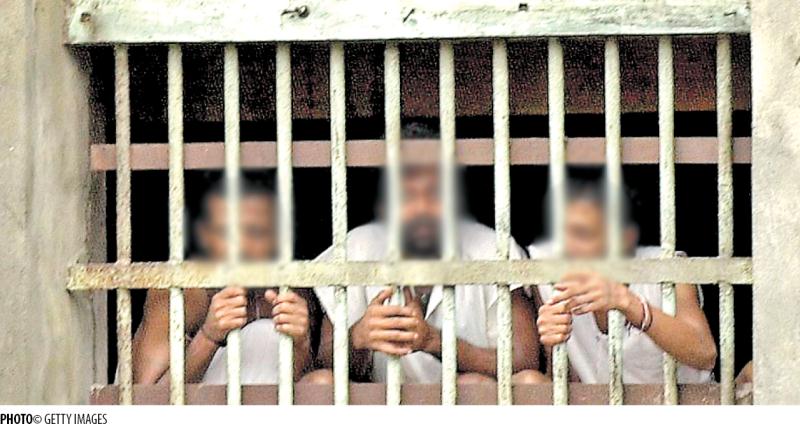 By Skandha Gunasekara
By Skandha Gunasekara
With President Gotabaya Rajapaksa’s all-or-nothing crackdown on the illegal narcotics trade going into full force in the past few months, the already congested prison system in Sri Lankan is bursting, with some 5,000-odd additional individuals being incarcerated in the last two months alone.
Commissioner General of Prisons Thushara Upuldeniya said the sudden increase in prisoners had strained the prison system.
“There are about 8,000 drug addicts in prisons across the island, 5,000 of whom were incarcerated within the last two months.”
The Commissioner General said prisons were facing issues of drug addicts going into withdrawal and suffering from health issues due to the lack of drugs, and also suicides and attempted suicides.
“There have been three suicides of drug addicts in the last few weeks within prisons in Sri Lanka as they underwent withdrawal symptoms as a result of going cold turkey to cease addiction,” he said.
He said that the incidents took place at the Welikada, Negombo, and Boossa Prisons.
He went on to note that as a result of the increase in the number of inmates, the costs incurred by the State too had increased drastically.
“The average cost per prisoner went up drastically in just two months. This is not a small amount that’s weighing on the prison system. It is crucial that alternatives to imprisonment be found as a penalty for those convicted of drug-related offences,” he said.
In 2018, the average cost per prisoner per day was Rs. 695.
Accordingly, the cost increase as a result of the additional 5,000 would be Rs. 3,475,000 per day.
Annually, the cost would be Rs. 1.2 billion just for the 5,000 convicts incarcerated in the last two months.
He went on to say that the issue of overcrowding within prisons has been continuous, due to the limited prison space and number of prisons in contrast to the high number of convicts and those in remand.
“There are a high number of remand prisoners as well as convicted prisoners. I believe there’s an estimated 15,000 remand prisoners – most of them on drug-related charges. It’s hard to handle the influx of prisoners, especially the increase in prisoners on drug-related offences.
“We have requested that an alternative to imprisonment be found for those convicted of drug-related offences,” he reiterated.
Temporary measures
He went on to say that a temporary solution was to increase infrastructure and other facilities in the prison system itself, stating: “We are in the process of broadening facilities and increasing infrastructure within prisons, such as increasing the number of buildings.”
With regard to the issue of drug addicts facing withdrawal symptoms while incarcerated, the Commissioner General said they were able to manage the situation following the suicides over the latter part of last month.
“We have been able to control the drug addict issues within the prisons. But we do see a large number still being admitted to prison hospitals on a daily basis. It has increased at least by two to three times the usual amount,” he shared.
Meanwhile, Minister of Sports and Youth Affairs Namal Rajapaksa on Friday (4) took to social media platform Twitter to voice his views on the need to conduct rehabilitation programmes for drug users in place of serving them with prison sentences.
“The rehabilitation of #lka drug users is a far more fruitful solution to this scourge that plagues our nation over persecution. Following discussions with both ministers of justice and rehabilitation, all stakeholders showed interest to initiate a prog. that explores solutions,” Minister Rajapaksa tweeted.
On the issue of rehabilitation, the Government earlier this year teamed up with Avant Garde Maritime Services to conduct a prisoner rehabilitation programme – particularly for those convicted of drug-related offences.
The programme was kicked off in June this year and is to see prisoners with short sentences be trained in various skills such as carpentry and masonry, so as to become skilled workers upon completion of their prison terms.
The Avant Garde Group and its Chairman Maj. (Retd.) Nissanka Senadhipathi will provide the teachers, trainers, as well as the meals for the programme. The project would function as a public-private partnership (PPP) between the Government and the Avant Garde Group.
Senadhipathi, speaking to The Sunday Morning, said he would gladly bear all the costs for this programme, and that prominent companies in the industrial and business sectors were keen on taking part in the project as well.
“Prisoners will be utilised after being trained for different vocations such motor mechanics, carpenters, electricians, and plumbers. Avant Garde is bearing all the costs for this programme and we will continue to provide more facilities.
“They (prisoners) will be taken to various locations with the supervision of the prison officials and they’ll be working in those locations. Top-level businessmen and construction agencies have agreed to work with us on this programme and hire these prisoners. Access, BMW, Prime Investments, MAGA, and Tudawe Brothers are all helping us in this.”
The programme is expected to result in the rehabilitation of 5,000 inmates in one year.
 By Skandha Gunasekara
By Skandha Gunasekara By Skandha Gunasekara
By Skandha Gunasekara